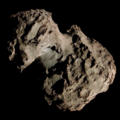C/1998 H1 (Stonehouse)
Appearance
| Discovery | |
|---|---|
| Discovered by | Patrick L. Stonehouse |
| Discovery site | Wolverine, Michigan |
| Discovery date | 22 April 1998 |
| Orbital characteristics[1] | |
| Epoch | 13 May 1998 (JD 2450946.5) |
| Observation arc | 91 days |
| Number of observations | 407 |
| Aphelion | 1,442.77 AU |
| Perihelion | 1.487 AU |
| Semi-major axis | 722.129 AU |
| Eccentricity | 0.99794 |
| Orbital period | 19,405.77 years |
| Inclination | 104.693° |
| 222.109° | |
| Argument of periapsis | 1.325° |
| Last perihelion | 14 April 1998 |
| TJupiter | –0.376 |
| Earth MOID | 0.4796 AU |
| Jupiter MOID | 3.9427 AU |
| Physical characteristics[2] | |
| Comet total magnitude (M1) | 10.0 |
| Comet nuclear magnitude (M2) | 14.5 |
| 12.0 | |
Comet Stonehouse, formally designated C/1998 H1, is a non-periodic comet discovered in April 22, 1998 by Patrick L. Stonehouse of Wolverine, Michigan, USA.
With a maximum brightness of about 12.0 in April/May 1998,[2] Comet Stonehouse was too faint to be seen by the unaided eye, but it was a popular object for telescope-equipped comet watchers.[3]
References
[edit]- ^ "C/1998 H1 (Stonehouse) – JPL Small-Body Database Lookup". ssd.jpl.nasa.gov. Jet Propulsion Laboratory. Retrieved 7 November 2024.
- ^ a b S. Yoshida. "C/1998 H1 ( Stonehouse )". www.aerith.net. Retrieved 19 April 2018.
- ^ Nemiroff, R.; Bonnell, J., eds. (14 May 1998). "Comet Stonehouse". Astronomy Picture of the Day. NASA. Retrieved 19 April 2018.
External links
[edit]- C/1998 H1 at the JPL Small-Body Database


